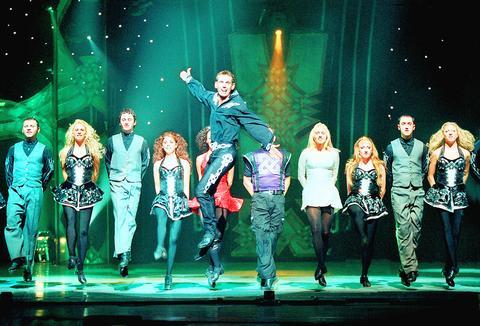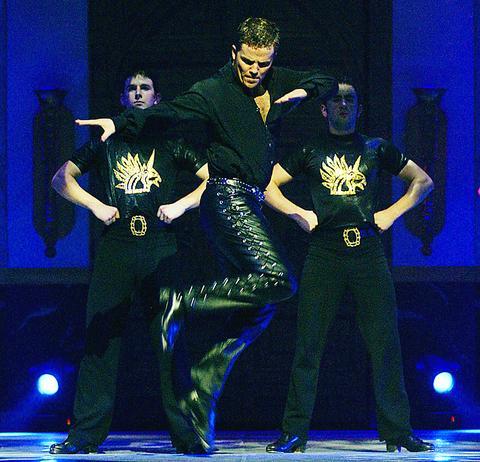In the past three years or so, there has been a growing tap dance craze in Taipei. On TV, a young girl does a solo tap dance on the balcony of European-style apartment, for a chicken stock commercial. In another ad, for instant coffee, a dancer taps his way through rainwashed streets while performing Gene Kelly's Singing in the Rain. Irish dance group The Spirit of Dance visited two years ago, as did Gaelforce last year. And this year, it is the turn of Lord of the Dance, which was founded by the renowned dancer Michael Flatley.
The group has already completed two shows, on Wednesday and yesterday, and there are five more shows to go. As expected, tickets are selling like hot cakes. So far 80 percent of the seats are gone and only a few that cost NT$3,200 are left. The attraction of Irish dance is obviously still powerful for Taiwan audiences.
Some traditional Irish dancers may be turning in their graves, but Celtic dance mixed with modern choreography and pyrotechnics is now popular in both Broadway and Las Vegas. Dancers now wear heavy and vivid make-up and proudly show off their bodies. They dance in orderly lines and raise their arms and a burst of fire erupts from the stage. It has come a long way from the traditional Irish dance previously performed in a pub, town hall or square.

PHOTO COURTESY OF KHAM ARTS
In 1998, Michael Flatley and the Lord of the Dance group of 120 dancers drove an audience of 25,000 in London's Hyde Park crazy with the groundbreaking production Feet of Flames. It then packed out Wembley Stadium for 21 consecutive nights.
Lord of the Dance is so popular around the whole world that it takes three troupes to meet with the demand for shows. In just seven years, Lord of the Dance has performed in more than 30 countries, achieving box office returns of US$400 million, 12 platinum record awards for their VCD/DVD sales, plus CD sales of 10 million.
Michael Flatley, the founder and artistic director of the Lord of the Dance (and the man who became the fastest tap dancer in the world in 1996 at 35-steps-per second; a record later broken by Michael Donnellan with 40-steps-per second), was without doubt the inspiration behind the world-wide popularity of the show.

PHOTO COURTESY OF KHAM ARTS
The former lead dancer of River Dance, Flatley left the troupe in 1996 and formed Lord of the Dance. In conjunction with composer Ronan Hardiman, Flatley developed a dance style that was more Irish, more powerful and more energetic than River Dance.
Flatley's charisma is a key to the popularity of Lord of the Dance. When he shows up on stage, he likes to run into the center of the stage with force and is greeted by cheers and screams from the audience. He has rock-star status.
In Taiwan, a fanclub and Web site dedicated to Flatley was started three years ago. Hundreds of his Taiwanese fans voluntarily translate information and news about the troupe into Chinese. For the first visit of Lord of the Dance to Taiwan, the club encouraged its members to promote and buy tickets.

PHOTO COURTESY OF KHAM ARTS
Because of the fervor of his fans here perhaps, although Flatley could not make it for the Taipei performances, he sent a message: "Our show allows us the unique opportunity to bring a little touch of Ireland to the international stage and lets our audience savor the excitement and enjoy it for themselves. Although I will not be in Taipei, I am pleased that our show has been invited to perform there," the message from Flatley said.
Lord of the Dance is now divided into three troupes. The fourth troupe will be established in March this year. The group coming to Taipei is Troupe 1, led by former dance champion Damian O'Kane, who will be playing Flatley's original role as the lord of the dance. Together with 40 dancers and 10 musicians, Troupe 1 will undoubtedly move the Taipei International Convention Center for the next three days.
"We will bring the best to our Taiwan audience. And we guarantee the entertainment will not be a tiny bit less than our shows elsewhere," said O'Kane on Tuesday at their Taipei press conference.

In the March 9 edition of the Taipei Times a piece by Ninon Godefroy ran with the headine “The quiet, gentle rhythm of Taiwan.” It started with the line “Taiwan is a small, humble place. There is no Eiffel Tower, no pyramids — no singular attraction that draws the world’s attention.” I laughed out loud at that. This was out of no disrespect for the author or the piece, which made some interesting analogies and good points about how both Din Tai Fung’s and Taiwan Semiconductor Manufacturing Co’s (TSMC, 台積電) meticulous attention to detail and quality are not quite up to

April 21 to April 27 Hsieh Er’s (謝娥) political fortunes were rising fast after she got out of jail and joined the Chinese Nationalist Party (KMT) in December 1945. Not only did she hold key positions in various committees, she was elected the only woman on the Taipei City Council and headed to Nanjing in 1946 as the sole Taiwanese female representative to the National Constituent Assembly. With the support of first lady Soong May-ling (宋美齡), she started the Taipei Women’s Association and Taiwan Provincial Women’s Association, where she

Chinese Nationalist Party (KMT) Chairman Eric Chu (朱立倫) hatched a bold plan to charge forward and seize the initiative when he held a protest in front of the Taipei City Prosecutors’ Office. Though risky, because illegal, its success would help tackle at least six problems facing both himself and the KMT. What he did not see coming was Taipei Mayor Chiang Wan-an (將萬安) tripping him up out of the gate. In spite of Chu being the most consequential and successful KMT chairman since the early 2010s — arguably saving the party from financial ruin and restoring its electoral viability —

It is one of the more remarkable facts of Taiwan history that it was never occupied or claimed by any of the numerous kingdoms of southern China — Han or otherwise — that lay just across the water from it. None of their brilliant ministers ever discovered that Taiwan was a “core interest” of the state whose annexation was “inevitable.” As Paul Kua notes in an excellent monograph laying out how the Portuguese gave Taiwan the name “Formosa,” the first Europeans to express an interest in occupying Taiwan were the Spanish. Tonio Andrade in his seminal work, How Taiwan Became Chinese,